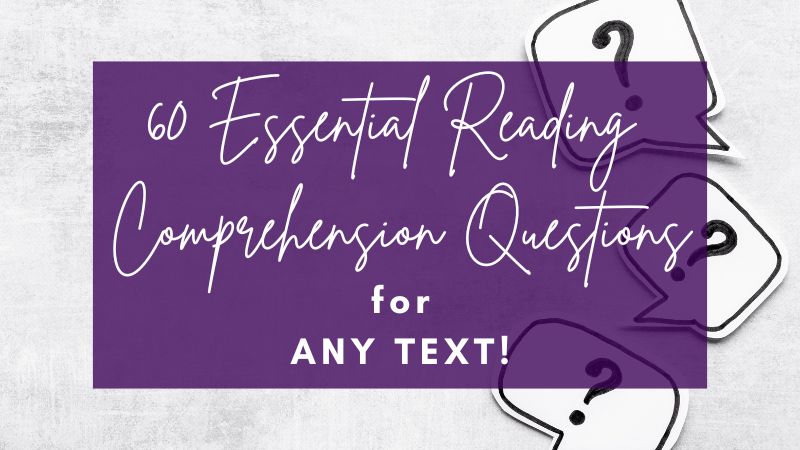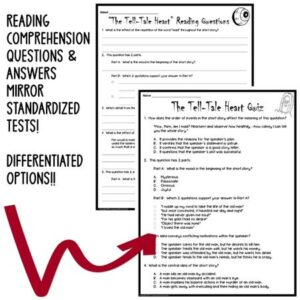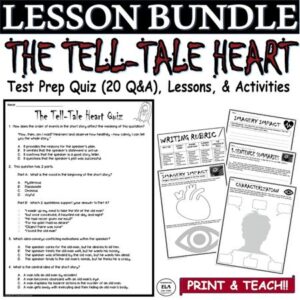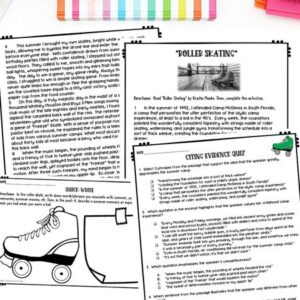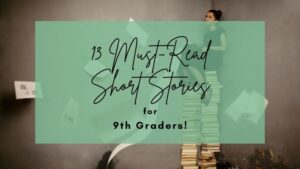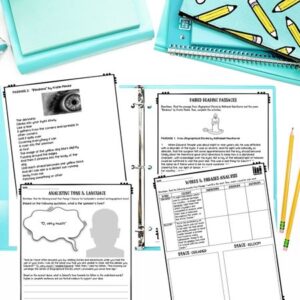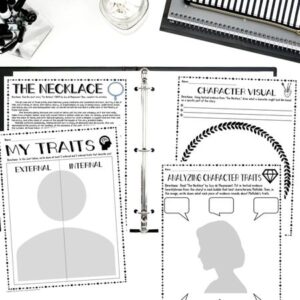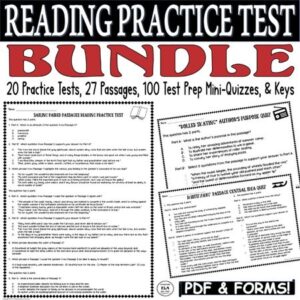Have you ever asked your students some pretty basic reading comprehension questions about the assigned reading and all you experience is deafening silence? You are not alone, my teacher friend!
While one of my favorite pastimes is reading, most of my students do not share the same perspective. And sometimes, I don’t get it.
Reading takes you to new worlds with new people and new adventures. There is so much to enjoy about reading when you find a story you love. Plus, if you are not clicking with a specific text, you can always stop reading it. I’ve done this many times before.
So when it comes to simply responding to reading comprehension questions, I wish I could relate to those students who groan with the drama of a Shakespearean actor!
It just doesn’t compute. All we are doing is discussing what we have read. That’s it!
Well, after 18 years of teaching, I have come to realize that many students struggle with answering reading comprehension questions for several reasons:
- They don’t want to read at all.
- They don’t want to do the hard work of thinking about what they have read.
- They don’t want to reread when they have spaced out while reading.
- They don’t want to look up words they don’t know.
- They don’t want to talk or write about anything.
These reactions are diametrically opposed to my own education. We simply did not have a choice when given reading comprehension questions or analysis activities in general. You did whatever the teacher asked and that was that. Times have changed, and so have our students, but the standards, for all intents and purposes, have not.
To make your life a little easier, having ready-to-use reading comprehension questions is a must!
Keep reading for 60 Essential Reading Comprehension Questions for ANY Text!
Need help with Test Prep? Check out this FREE Pack of 3 Test Prep Activities to help students achieve success on standardized tests!

60 Essential Reading Comprehension Questions for ANY Text
Although fiction is inherently different than nonfiction, reading comprehension questions can usually be applied purposefully to most reading passages. Feel free to change up the questions below for the text of your choosing!
MAIN IDEA/THEME QUESTIONS
Main Idea or Central Idea primarily captures what the text is mostly about. It usually connects to a single topic and/or subtopics and encompasses the primary point(s). Every main idea typically can be supported with MANY pieces of evidence from various paragraphs and/or pages within the passage.
Theme, in contrast, is a message about the topic and/or subtopics from a piece of fiction or even a narrative.
Let’s look at “The Tell-Tale Heart” by Edgar Allan Poe as an example text.
Central Idea: Ex. The Tell-Tale Heart relays the story of a mentally unstable young man who plans a murder, kills an old man that he lives with all because of a supposedly abnormal eye, and eventually confesses his crime to investigators.
Theme: Ex. Mental health issues can cause people to behave irrationally and believe senseless things.
10 READING COMPREHENSION QUESTIONS ABOUT THE CENTRAL IDEA/THEME:
- What is the main idea of the first sentence, paragraph, or chunk?
- How does the main idea of the ____ paragraph relate to the main idea of the ____ paragraph?
- What textual evidence supports the main idea of the paragraph?
- What evidence does not directly support the main idea?
- What is the main idea of the entire text?
- How is the central idea supported throughout the text?
- What is a message/theme from the text?
- How does the author develop the theme at the start of the text?
- What might be a secondary theme from the text?
- What evidence supports the theme of the text?
Need some teaching ideas for “The Tell-Tale Heart,” click here!
MAKING INFERENCES/CITING EVIDENCE/DETAILS
Inferences are conclusions one can draw about the setting, characters, and events based on specific details within a text. When one makes inferences, referring to Textual Evidence (words, phrases, & sentences from the text) is a MUST! Asking students about evidence for every assertion they make SHOULD be one of our primary goals as Reading and English Teacher!
“Roller Skating” by Kristin Menke is a fun narrative to use for teaching about citing evidence! See below for quizzes and lessons!
10 READING COMPREHENSION QUESTIONS ABOUT EVIDENCE:
- How does the author describe the setting of the text?
- What types of evidence illustrate the setting of the text?
- How does the author describe the various characters of the story?
- What pieces of evidence offer details about the characters?
- What can the reader assume about a character’s internal or external traits?
- What conclusion can the reader draw based on the end of the text?
- What might the author/speaker be like based on the text?
- What can the reader infer about what is really happening in the text, paragraph, or dialogue?
- How does the author use evidence to support his/her ideas about…?
- What evidence helps to contribute to the meaning of the text?
Need some short story ideas for 9th graders? Check out the post below!
WORDS & PHRASES
Typically, when we talk about standards related to Words and Phrases, we are doing more than asking about simple definitions. We want our students to be able to identify and examine the purpose of each specific word and phrase. Asking the harder questions should become a part of the everyday routine!
Words & Phrases cover the following and more:
- context clues
- word meaning
- multiple meaning
- synonyms
- antonyms
- effect
- meaning
- description
- figurative language analysis
- tone
- mood
If you want to up the ante as you teach about words and phrases, try using paired passages for higher-level analysis!
10 READING COMPREHENSION QUESTIONS ABOUT LANGUAGE:
- What words are important in the introduction and why?
- What tone is used at the start of the text?
- What words and phrases contribute to the tone?
- What types of figurative language are utilized throughout the text?
- What might be a synonym or antonym of ____________ (vocabulary word) based on the passage?
- What is the effect of the description of …?
- How does the title of the text affect its meaning?
- How do the last words/phrases of the text contribute to the meaning of the story?
- What is the effect of the words on the mood?
- How does the language contribute to the meaning of the text?
Need a fun poem to teach imagery that your students have NEVER read before? Check out “The Passerby” by Kristin Menke!
STRUCTURE
Rhetors (Authors, Writers, and Creators) use a specific structure purposefully. When writing a story, a writer uses a chronological or sequential structure. If a food writer tells you about a dinner he/she ate, the structure may be termed a description. Or if you are writing a news article about the devastation from a hurricane, you might employ a cause/effect structure.

While teaching the various structures can help, state tests most likely will not ask students to identify the structure. Instead, students need to dig more deeply and analyze the structure’s purpose.
10 READING COMPREHENSION QUESTIONS ABOUT STRUCTURE:
- What are the most important events/moments in the text?
- What is the most significant incident in the text and why?
- How does the author order specific circumstances in the text?
- How does the writer begin the text?
- How does the author end the text?
- Why does the author begin and end the text in the way he/she does?
- How might the meaning change if _______________ had not happened?
- What is the pace of the text?
- How does the pace of the text contribute to the meaning of the text?
- How does the author/writer create tension in the text?
CHARACTERIZATION
One might think that characterization (description of a person’s/character’s internal and/or external traits) is easy to identify and analyze, but for many students, this standard is an area of struggle. Teaching characterization directly is a must-do every year! Check out this freebie to help with introducing characterization!
10 READING COMPREHENSION QUESTIONS ABOUT CHARACTERIZATION:
- How is the protagonist (main character) depicted at the beginning of the text?
- How is the antagonist (opposing character) described at the start of the text?
- How is a character/person portrayed at the end of the text?
- How is the protagonist or antagonist illustrated at the end of the text?
- At what point does the protagonist or antagonist change and why?
- How does a character/person develop from the start of the text until the end?
- What ___ traits does the speaker, character, or author have?
- How does the development of _____________ (character’s name) contribute to the meaning of the text?
- How is _____________ (character’s name) similar to _____________ (character’s name)?
- How is _____________ (character’s name) different from _____________ (character’s name)?
“The Necklace” by Guy de Maupassant is a FUN and EASY-TO-READ short story that is PERFECT for teaching characterization! Check out this resource to make teaching about characterization stress-free!
AUTHOR’S PURPOSE
Although the go-to wording for the author’s purpose is to persuade, inform, and entertain, I have found that most students will not see these words on ANY test they take throughout the year. So, we need to help students expand their lexicon in connection to the author’s purpose.
How about using these words instead for the author’s purpose:
- argue
- convince
- assert
- declare
- proclaim
- emphasize
- highlight
- illustrate
- empower
- fight for
- support
- portray
- enable
- enlighten
- claim
- attest
Here is an Analysis Verb List to help with answering reading comprehension questions about the Author’s Purpose!
10 READING COMPREHENSION QUESTIONS ABOUT THE AUTHOR’S PURPOSE:
- What is the purpose of opening the text with…?
- What is the overall purpose of the text?
- How do the first and last paragraphs support the author’s purpose?
- What techniques/types of support does the author use in connection to his/her purpose?
- What does the author/speaker/writer hope to accomplish by creating this text?
- Who is this text intended for?
- What is the specific perspective of the speaker/writer of the text?
- How is the perspective of the text vital in connection to the audience?
- How does the point of view play a role in the meaning of the text?
- How is the point of view important in achieving the rhetor’s (author’s) goals?
READING COMPREHENSION QUESTIONS RESOURCE:
Do you need High School Reading Comprehension Questions to add to your repertoire? This Reading Test Prep Practice Test BUNDLE helps upper middle and high school students prepare for state reading standardized tests! It contains Questions and Answers that mirror what your students will see on their formative and/or end-of-year tests!
This BUNDLE includes 27 passages (fiction, nonfiction, and paired texts), which could be used for 7th-10th graders with or without teacher guidance, depending on the amount of differentiation needed for each student. You can give students 20 whole multiple-choice tests OR assign 100 mini-quizzes based on single standards!
Just PRINT/ASSIGN & TEACH!!
Need more reading comprehension questions for middle and high school students? Check out my store Kristin Menke-Integrated ELA Test Prep!

